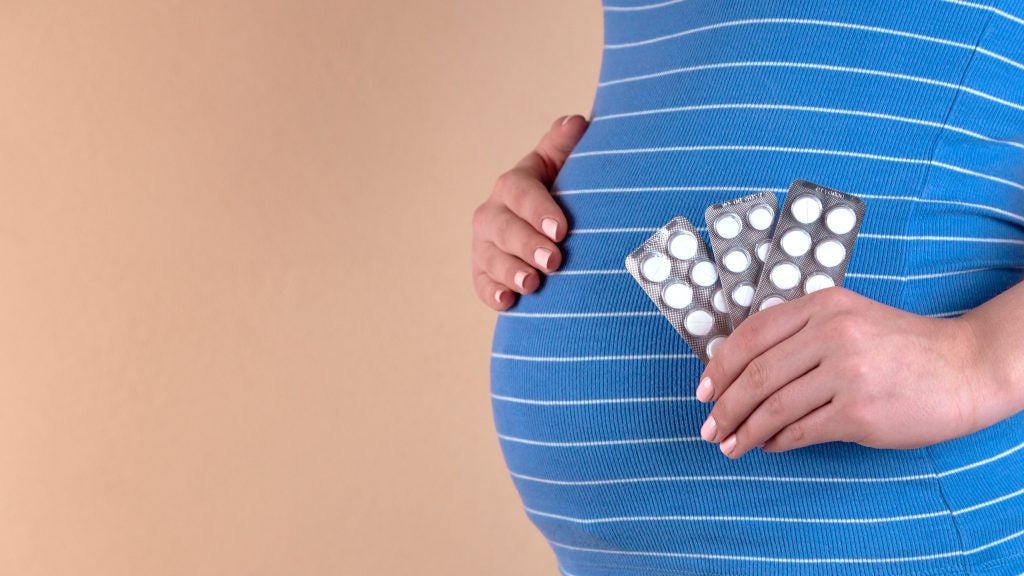Maintaining a healthy and balanced diet before, during, and after pregnancy is vital to ensure the future wellbeing of your child. It is highly recommended that women who are trying to conceive or who are already pregnant take prenatal vitamins in order to maintain overall health as well as the health of their baby.1

Table of Contents
Important Vitamins During Pregnancy
There are certain vitamins and minerals that have been found to be especially helpful in maintaining fetal health. Among these are folic acid, calcium, iron, iodine, and omega-3 fatty acids.
Folic acid has been found to help prevent any neural tube defect, which can be detrimental to the brain and spinal chord.1 If you are planning on getting pregnant, you can talk to your doctor about utilizing folic acid supplements, as taking them early can be the most effective way to prevent these defects. Folic acid can be found in natural sources such as green leafy vegetables, nuts, beans, and citrus fruits.1
Calcium is always an important pillar of a healthy diet and especially so during pregnancy. Calcium is necessary for bone growth in the fetus, so making sure that one has enough calcium can prevent a loss of bone density in the mother and child.1 Some foods that contain high levels of calcium are leafy greens such as collards, spinach, and kale; dairy products such as buttermilk, cheese, and yogurt; fish such as sardines and salmon; and tofu.2
Iron is important for a baby’s growth and development, and it can help prevent anemia in the mother. Anemia is a condition where the blood has a low number of healthy red blood cells.3 A woman’s body produces more blood during pregnancy, putting the woman at risk for iron-deficiency anemia since the iron can be spread thin. Iron will also help the blood of the mother and baby carry oxygen.1 Some foods that are high in iron include lean beef, chicken, turkey, beans, lentils, tofu, cashews, and dark leafy greens.4
Iodine should be kept at healthy levels to ensure that the mother’s thyroid is able to function properly during pregnancy. Extreme iodine deficiency can lead to stunted growth, mental disability, deafness, or miscarriage.1
Omega-3 fatty acids have recently been studied and found to be beneficial during pregnancy. They have been found to be critical for the neurological and early visual development in a fetus and can later be helpful for the mother’s breast milk production. In addition to having a positive effect on visual and cognitive development, omega-3s have been linked to a reduced risk of allergies in infants, reduced risk of preeclampsia in the mother, and a potential increase in the child’s birthweight. Omega-3 fatty acids are mostly found in fish, but given the levels of mercury found in fish, a purified fish-oil supplement may be the safest way to obtain omega-3s while pregnant. If you decide to take a fish-oil supplement, it is important to choose a high-quality fish-oil manufacturer that provides proof of purity. Avoid oils that smell or taste unpleasantly fishy, as this may indicate that the oil is degrading and is no longer fresh. High quality fish-oil should not taste or smell fishy, nor should it have strong artificial flavors that could be used to mask the flavor of rancid oil.5
Possible Side Effects

One possible side effect that comes as a result of taking a prenatal vitamin is nausea and queasiness. Taking the vitamin with food or taking it before going to bed may help reduce this effect.3 If the nausea persists, your doctor may be able to prescribe something different, for example, a chewable or liquid vitamin which will not have the same side effects.1
Another possible side effect is constipation, which can be attributed to the increased levels of iron in the body. To counteract this, it is important to drink lots of fluids, consume healthy amounts of fiber, and integrate a reasonable amount of physical activity into your day-to-day life. If these methods do not help, a physician can prescribe a stool softener.3
Choosing a Prenatal Vitamin
If you are trying to get pregnant, or are already pregnant, and are thinking about taking a prenatal vitamin, the first step would be to discuss it with your physician. The doctor can take into account your lifestyle and any health conditions you have in order to choose a supplement that will work best for you. For example, if a woman is prone to iron-deficiency anemia, the doctor may prescribe a multivitamin supplement that has a higher amount of iron than other supplements. There is such a thing as overdosing on vitamins, which could be harmful for the baby, so maintaining communication with your doctor will ensure that you are receiving the appropriate amounts of nutrients.6
Prenatal Vitamins Are Not a Substitute for a Heathy Diet

It is important to remember that prenatal vitamins are only a supplement to enhance one’s diet and are not a substitute for a healthy, balanced diet. Maintaining overall health through exercise, proper hydration, and a diet full of unprocessed food, fruits, vegetables, and grains is the best way to ensure the health of both the mother and the unborn child.
References
- “Pregnancy and Prenatal Vitamins.” WebMD, WebMD, 2016.
- “Food Sources of Calcium.” Dietitians of Canada, 17 June 2016.
- “Prenatal Vitamins: Why They Matter, How to Choose.” Mayo Clinic, Mayo Foundation for Medical Education and Research, 13 Sept. 2016.
- Kaufman, Caroline. “Foods to Fight Iron Deficiency.” Eat Right. , Academy of Nutrition and Dietetics., 5 Jan. 2018.
- “Omega-3 Fish Oil and Pregnancy: Benefits & Proper Dosage.” American Pregnancy Association, 2 Sept. 2016.
- “Prenatal Vitamins.” American Pregnancy Association, 30 Nov. 2017.
Last Updated: 11 March 2018.
